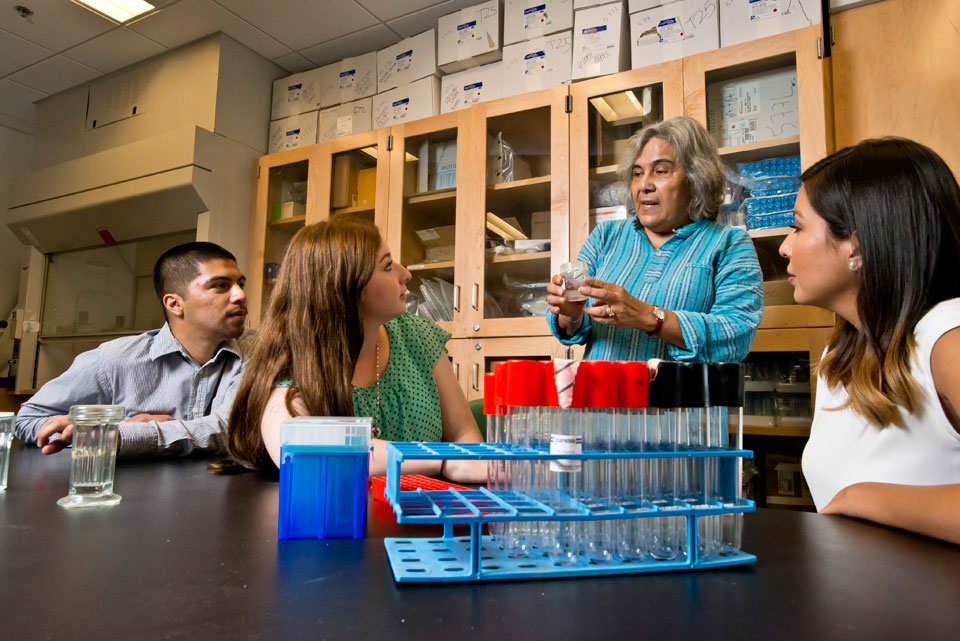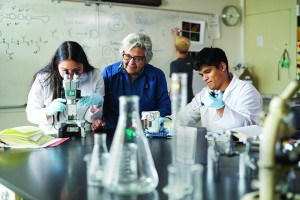CSUN Biology Professor Part of Efforts to Raise Awareness & Find Solutions for Lack of Early Career Latinas in STEM

Maria Elena Zavala hopes the new published research sheds light on underrepresentation in Latinas in STEM.
While Latinos represent a growing and important demographic in the United States, there is notable underrepresentation when it comes to STEM (science, technology, engineering, and mathematics) careers.
With efforts to raise awareness and identify solutions to the underrepresentation, an intergenerational group of 16 Latinas and allies, including California State University, Northridge biology professor Maria Elena Zavala, collaborated to highlight challenges faced by early career Mexican, Puerto Rican, and Central American Ancestry (MPRCA) Latinas. Their research, titled “Early Career Latinas in STEM: Challenges and Solutions,” was released in the November issue of the journal Cell.

Biology professor MariaElena Zavala (center), lead director of CSUN’s U-RISE program, is passionate about providing undergraduates with opportunities to conduct scientific research
Zavala, the first Mexican-American woman in the country to earn a Ph.D. in botany, hopes the published research sheds light on an issue she herself has combatted throughout her distinguished career.
“I don’t like the idea of being underrepresented because we’re not underrepresented,” Zavala said. “We’re excluded and the assumptions are still there about what women can’t do and what people of color can’t do. That is from the decision makers that have presumed stereotypes and I’ve noticed that it is still really tough to break those stereotypes.”
In 2022, Latinos, as a group, made up more than 19 percent of the U.S. population, or nearly 64 million individuals. Consequently, nearly 1 in 5 Americans is Latino, with individuals of Mexican ancestry comprising 62.3 percent of US Latinos, while Puerto Ricans and Central Americans comprise 18 percent of all US Latinos and 1.7 percent of the U.S. population. Together, the three subgroups (MPRCA) represent 82 percent of all U.S. Latinos.
Despite these figures, Latinos continue to be underrepresented across the board in most job professions in the United States. Even worse, inclusion for both Latinas and Latinos remains relatively stagnant through all academic ranks, particularly in research laboratories, Ph.D. programs and at the faculty level.
In 2022, Latinos earned 9.6% of all STEM PhDs, however, the disparity is even greater for Latinas in academia. This issue is compounded by the fact the term “Latino” is a broad, pan-ethnic category that lumps together all Hispanics, including those with very different backgrounds from MPRCA, such as immigrants from South America with European ancestry, including from Spain, into one monolithic group.
Due to a lack of data on ancestry, MPRCA underrepresentation among US faculty or other professions remains unknown.
The research by Zavala and her colleagues identified multiple challenges that present barriers to MPRCA Latinas (and others) and solutions for those in the academic community, mentors and decision makers. Challenges include financial and environmental factors, academic exclusion and lack of mentoring, including inequitable education in low-income areas that reduce opportunities to pursue scientific careers.
“It’s not for a lack of interest in STEM,” said Zavala about the abysmal underrepresentation for MPRCA Latinas in STEM. “Many have few mentors or are busy taking care of family, but with the right support, this group has the potential to contribute and innovate the STEM field.”
Another roadblock identified includes how family roles and caretaking add to the stresses of pursuing a career in STEM.
According to Zavala, every Latina co-author on the paper had previously been a caretaker. While all racial and ethnic groups are involved in caretaking roles, for Latinas pursuing STEM careers, “financial and caretaking support for immediate or extended family can take a physical, emotional, and financial toll. Latinos report a high percentage of caretakers (21%), with this responsibility falling most often on Latinas,” the Cell paper said.
Solutions outlined for addressing lack of MPRCA Latinas in STEM include transparency in hiring and promotion decisions, mentoring and inclusion, collaboration across departments and faculty and upward mobility opportunities to strengthen diversity.
“The paper is for decision-makers at institutions that we hope can be used or referred to when making hiring choices with the intention of making departments more inclusive and diverse,” Zavala said. “There’s a lot of work to do and we’ve come a significant way but there’s still a lot more to be done in the areas of accessibility and breaking stereotypes in STEM.”

 experience
experience